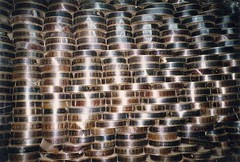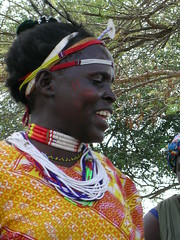| Image via Wikipedia |
They need help in supporting them with accommodation, health services and food.
You can contribute online to help the group here.
WEZESHA is a volunteer-powered organization founded two years ago and run and managed by LGBT.
In the UK. Freedom from Torture is a human rights organisation that exists to enable survivors of torture and organised violence to engage in a healing process to assert their own human dignity and worth. It has had many LGBT clients and joined with the Lesbian Immigration Support Group earlier this year to march in Manchester Pride.
They're holding a couple of fundraising events in the next fortnight. One is a great night of live music at Band on the Wall in Manchester (this includes £5 student tickets on the door). And they have organised a Christmas Concert in Chorlton.
UPDATE: Joseph has been freed!
 |
| Joseph Bokombe |
The St. Paul's Foundation for International Reconciliation is a San Diegan based non profit agency concerned with LGBT globally equality and has been supporting the work of Ugandan Bishop Christopher Senyonjo this past year. They are also sponsoring a young transgender Ugandan who was abducted and tortured before being granted asylum.
Any funds raised that are returned or left over from Joseph's bail and legal fees will be used to support this second victim of Uganda's horrific anti-gay laws. You can read more about this at: blog.stpaulsfoundation.com
We are looking for 400 people to each donate at least $25 to free Joseph for Christmas. He has been promised his old job and friends will accommodate him until he can get back on his feet.
“We can give one gay man, a fellow San Diegan, the gift of freedom,” said Canon Albert Ogle who is co chairing a holiday party event at LifeHOUSE on Thursday 15th December from 5-7.30 p.m. to pay for Joseph’s bail.
Tax deductible tickets or donations (if you cannot attend) can be purchased through the St. Paul’s Foundation for International Reconciliation.
“This money will really help both Ugandans to find a place where they no longer live in constant fear and stress”, said Canon Ogle.
“I can think of no greater gift that we could give to anyone this season than to give someone the gift of freedom. Joseph’s haunting story makes that biblical passage from Isaiah, also used by Jesus in his first public sermon so relevant to this season of Advent: that we are to “ bring good news to the poor.. to proclaim release to captives and to let the oppressed go free”, reflected Ogle.



















![Reblog this post [with Zemanta]](http://img.zemanta.com/reblog_e.png?x-id=156c48f2-8f69-4f04-8f67-12a72a0f539f)





 Join our page
Join our page

